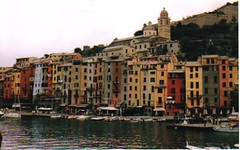 The most remarkable thing about Portevenere is the first appearance as you come into the bay area. The houses are actually a wall, standing next to one another and colored with dull yellows and reds, light and dark grays. Because such coastal villages were the target of pirates and plunderers, the inhabitants decided to build their homes in the form of a wall. Rather than walling the town as many other areas did, they built their homes, one right next to another and high enough to form a wall. Behind the first row, the land climbs into a second tear and hence into another wall of homes.
The most remarkable thing about Portevenere is the first appearance as you come into the bay area. The houses are actually a wall, standing next to one another and colored with dull yellows and reds, light and dark grays. Because such coastal villages were the target of pirates and plunderers, the inhabitants decided to build their homes in the form of a wall. Rather than walling the town as many other areas did, they built their homes, one right next to another and high enough to form a wall. Behind the first row, the land climbs into a second tear and hence into another wall of homes.When one thinks of the Riviera, he probably thinks of sandy beaches and modern cities. That is partly true of the French Riviera which does front on a modern city; although the beaches are not sand, they are rock and the attraction is not the water but the warm weather where people from the cold north of Europe can escape. And it is partly true of the Italian Riviera, but there is also a rugged coastline that spans eleven miles of sheer rock and cliffs so steep that only the hardiest can work them.
Into these sheer cliffs the villagers have terraced vineyards and olive trees. In some sections a person may purchase a small parcel of this land provided she agrees to keep it ecologically sound and works to keep it that way.
Yes, there are tourists who visit there. A lot of boats pull into these remote villages. But the character of the village does not change. There is a subtle dignity and individuality to each village. The villagers go about their normal day as if the tourist does not exist. They meet your eyes with a quiet confidence that tells you they are the inhabitant and you are the stranger. The merchants do not hawk their wares but permit you time to view and decide. And if you pass without purchasing, they do not say, “Have a nice day.” They simply go about their business as if you had never been there in the first place. Oh, but it’s hard to pass up the goods and the bargains.
It is sad to be there and not know the language for I am certain these people all have tales to tell and I am equally certain that at night, they sit around their fires, sipping a glass of wine and speaking of the funny looking tourists they saw that day. But when one is in a nation where he does not speak or understand the language, only then do we understand that the mind communicates by thought and not by word, and there are always ways to communicate the thought. Most of the menus were in Italian and English but even if they had not been, one would not starve. Sometimes mere eye contact was enough to affirm that a friendship can be struck even without knowing the language.
The modern names suggest that the area was settled by the Romans and indeed there is evidence of Roman engineering. The harbors are well sheltered and well maintained; otherwise, tourist boats could not get there. Once the boat (ship) has deposited its guests, it leaves the harbor and anchors outside. Once headed back to Portovenere, white wine is passed around to the passengers along with focaccia (a kind of bread) and cheese from the local areas just visited. Focaccia has a delicious texture, the softness of a bun, the sweetness of pastry, not really bread, not really cake, but a perfect blend of both.
I wish we had more time to spend in each village. Next blog I’ll write about the two villages we did visit.

